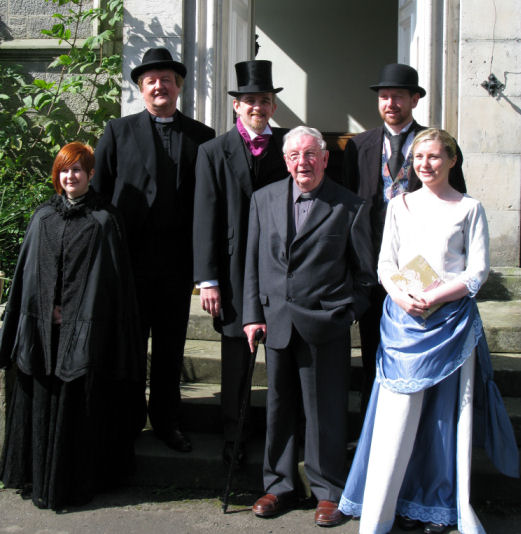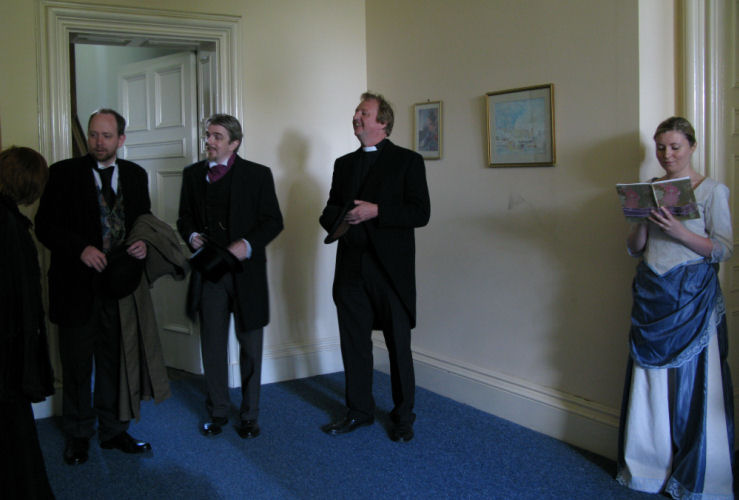Verniana — Jules Verne Studies / Etudes Jules Verne — Volume 2 (2009–2010) — 223–226
| Submitted August 30, 2009 |
Published October 10, 2009 |
| Proposé le 30 août 2009 |
Publié le 10 octobre 2009 |
The 150th anniversary of the passage of Jules Verne and Aristide Hignard through Oakley in 1859
Ian Thompson
Abstract
A group of enthusiasts in the Archives Department of Dunfermline in Fife decided to
celebrate the 150th anniversary of the passage of Jules Verne and Aristide Hignard through Oakley in 1859. They
established a magnificent series of events over three days, 26, 27 and 29th August 2009.
Résumé
Pour célébrer le 150e anniversaire de la visite de Jules Verne dans le comté de Fife, un groupe
d'archivistes de Dunfermline a organisé trois jours de festivités. Celles-ci comprenaient une reconstitution en costumes
d'époque de la marche de Jules Verne, accompagné d'Aristide Hignard et du Révérend Smith, de Crombie Point Inzievar House. Le
lancement d'une nouvelle traduction du Rayon Vert eut lieu à la bibliothque Carnégie de Dunfermline. Des acteurs recéèrrent à
Inzievar House l'arrivée de Verne au château; des prix furent attribués aux enfants des écoles primaires d'Oakley pour leurs
peintures sur des thèmes verniens; une réception fut organisée l'Hôtel de Ville de Dunfermline par l'adjoint au maire suivie de
la projection de deux films basés sur les oeuvres de Verne. Tous ces événements furent organisés par des acteurs enthousiastes
et furent l'objet de nombreux reportages dans la presse et la télévision.
A group of enthusiasts in the Archives Department of Dunfermline in Fife decided
to celebrate the 150th anniversary of the passage of Jules Verne and Aristide Hignard through
Oakley in 1859. They established a magnificent series of events over three days, 26, 27 and 29th August.
The first event on the 26th was a reconstruction of the walk from Crombie Point where Verne
disembarked from the steamer from Edinburgh where he was met by the Reverend Mr Smith. By studying old
maps it was possible to reconstruct the route taken by Verne. Members of the Dunfermline Dramatic Society
were dressed in period costume as Verne, Hignard and the priest. The start of the walk was covered by Scottish
Television in its evening news programme and there was substantial press coverage including a two page
article in the Daily Mail national paper.The walk started from the pier, paused at the Black Anchor Inn, where
Verne had had a whisky and then traversed fields to Inzievar House (which Verne refers to as Ockley Castle
in Voyage à Reculons) the baronial mansion of the Smith family. Many of the tracks that Verne took have
disappeared so the leaders had to get permission from farmers to cross fields to follow the route
exactly. Needless to say the walk was accomplished in pouring rain just as when Verne did it! Because
of the problem of crossing fields, the walk took almost twice as long as Verne.The participants were rewarded
with a badge bearing a humorous cartoon of Phileas Fogg and Passepartout!

Actors recreate the arrival of Verne at Oakley Castle. From left to right: a servant girl, the Reverend
Smith,Verne, Hignard and Amelia. In front is the present Catholic priest of Oakley.
The main event on the 27th was an evening book launch of The Green Ray in Dunfermline in the magnificent
setting of the Carnegie Library (Carnegie was a native of Dunfermline before making his fortune in the States).
I gave a talk on the relationship between The Green Ray and Verne's own voyage to the Hebrides. There
was an audience over 50 including some local Councillors and also an exhibition of photographs of underground
mining scenes taken by a former miner which gave some impression of conditions in The Underground City.
The audience had a convivial evening with wine supplied by the publisher, Luath Press.
Saturday 29th was the busiest day of the programme. A reception for twenty guests was held in the very
magnificent entrance hall where Verne arrived. While we sipped champagne we were treated to a short
performance by the actors. A young lady took the part of Amelia Bain and read from her diary an account of
Verne's visit to her home in Edinburgh. The other actors played the arrival of Verne in Inzievar... dressed in
costume and spoken in a French accent! Among the guests was the present catholic Cannon of the
parish, now in his eighties who enjoyed the portrayal of the Reverend Mr Smith. After the reception we
were taken on a guided tour of part of the estate garden which Verne had admired so much.

Actors recreate the arrival of Verne at Oakley Castle. From
left to right: Hignard,Verne, the Reverend Mr Smith and Amelia.
From Inzievar we moved on to Oakley village Community Centre, the focal point of this now rather
depressed mining village which Verne had seen in full activity before the closure of the ironworks and
mines. Here we had an audience of c50 for the award of prizes to young children from both the Catholic
and State schools who had participated in a painting competion of scenes from Verne. The actors
repeated their presentation and I gave a very short talk on Verne and writing for children. This was
followed by an address by the Deputy Provost of Dunfermline, then another by the General Secretary
of the Franco-Scottish Society (like Verne a Breton) who then presented the prizes (children's editions
of Verne's novels) and then unveiled a plaque commemorating Verne's visit. It is decided that the Oakley
Council will name a street after Verne... the first in the UK as far as I know.
From Oakley we progressed to Dunfermline to the superb City Council Chambers for a buffet reception
hosted by the Deputy Provost. About 50 people were present including Councillors from both Dunfermline and
Oakley. I said a few words about Verne's role as a town councillor and then a few gifts were given to people involved
in the events. I was offered two excellent framed photographs of the Black Anchor Inn (the photo that I posted was
inaccurate although almost identical...this time there is no doubt of the authenticity but I will need copyright clearance
before I can post them).
The reception finished with the unveiling of an enormous iced cake in the form of a book and covered in Verne motifs.
The final event was the showing of two films in the Carnegie Hall: Around the World in 80 days and Twenty
Thousand Leagues under the Seas. The children were all given a packet of "Phileas Fogg" potato chips the
brand name used by a local biscuit company.
It was a marvellous celebration,entirely the result of hard work and research by a group of
enthusiasts, without commercial sponsorship.
A wonderful three days, and apart from myself not an academic in sight!



